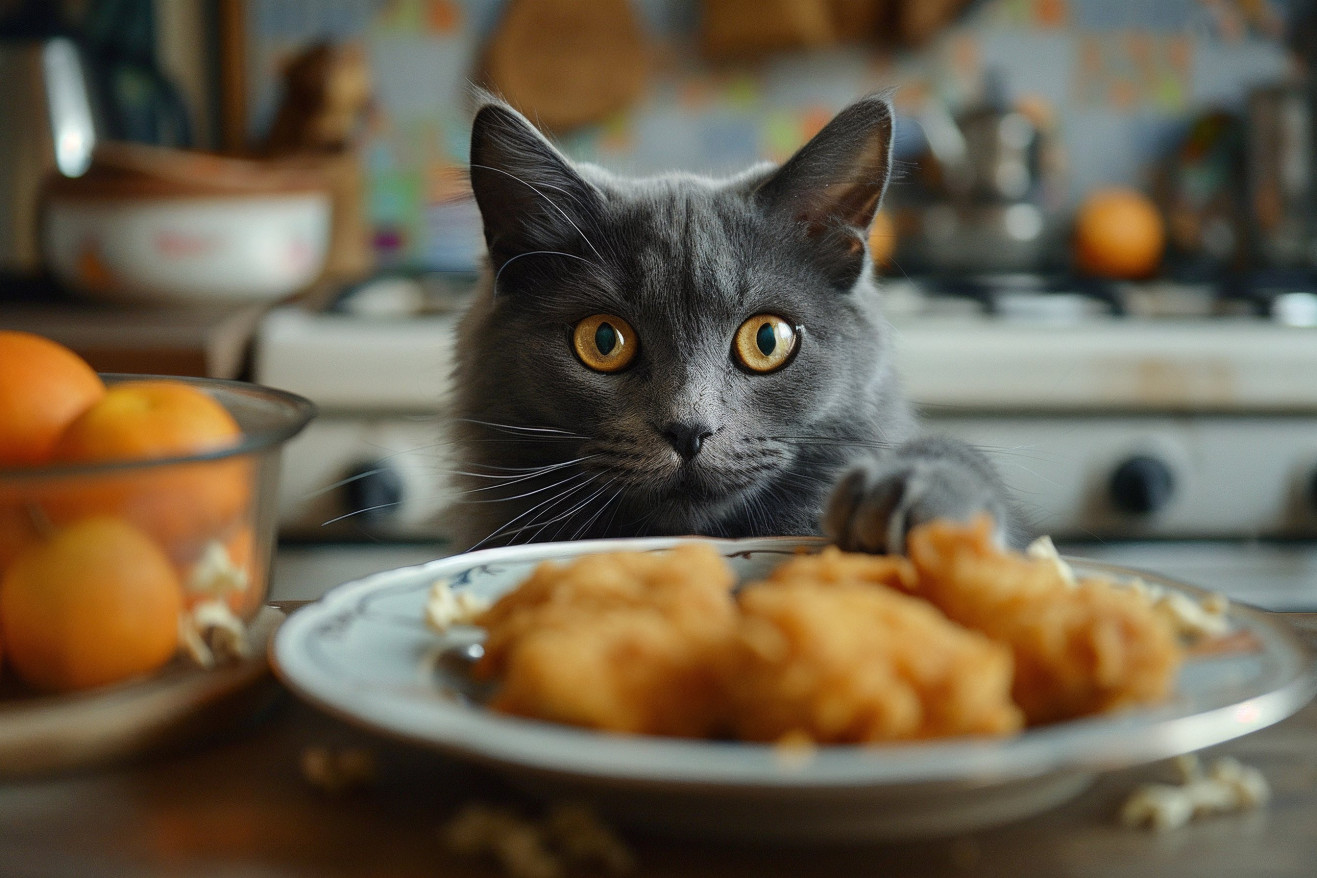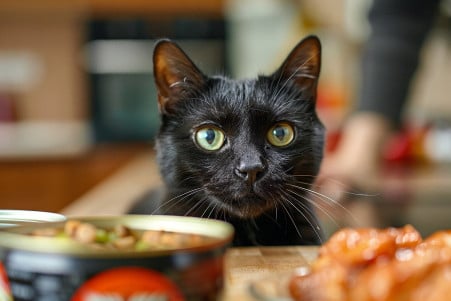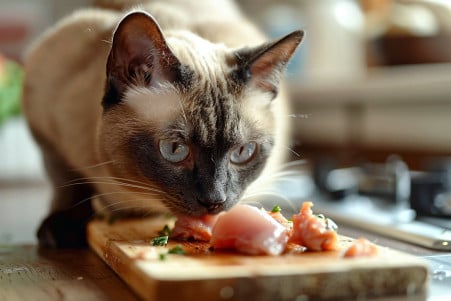Can Cats Eat Chicken Bones? Safety and Nutrition Guide
13 February 2024 • Updated 12 February 2024

If you’ve ever been eating a piece of chicken and your cat has come up to you begging for a bite, you may have wondered if it’s OK to give them the bones. However, experts say you should not feed your cat chicken bones.
Cooked bones can splinter and cause choking or internal damage, and raw bones can lead to bacterial infections. While it may be OK to feed your cat raw bones in moderation and under close supervision, you should be very careful.
To get a complete picture of whether or not it’s safe for cats to eat chicken bones, we will look at information from veterinarians and animal nutritionists. We will also look at the physiology of cats, including their digestive systems and teeth, to determine how they would handle eating chicken bones.
Finally, we will look at the potential health hazards and nutritional concerns to make sure you have all the information you need to feed your cat properly and keep them safe.
Can cats eat chicken bones?
What Cats Need in Their Diet: More Than Just Bones
Cats are obligate carnivores, so they require a diet that is high in animal-based nutrients. Protein is a must, according to the Cornell University College of Veterinary Medicine, and cats also need a number of vitamins, minerals, fatty acids, and amino acids to stay healthy.
The idea that bones are a necessary part of a cat’s diet is based on the fact that cats are obligate carnivores. However, domestic cats don’t need bones to meet their nutritional needs like wild cats do, and feeding them to cats can be dangerous.
Nutritionists have carefully formulated commercial cat foods to meet all of a cat’s nutritional needs, including those that bones might help meet. These foods are also tested by organizations like the Association of American Feed Control Officials for nutritional adequacy, and they are formulated to meet the needs of cats at different life stages.
As a result, cat owners can rest assured that if they choose a food that meets AAFCO standards, they are giving their cat everything they need for a healthy diet, without the risks associated with supplements like chicken bones.
Cooked Chicken Bones Can Pose a Danger to Cats
Another danger of feeding your cat chicken bones is the risk of injury from splintering. When bones are cooked, they become more brittle and are more likely to splinter. The Merck Veterinary Manual explains that if a cat eats bones that have splintered, it can result in life-threatening internal injuries or choking.
The sharp pieces of splintered bone can cut the lining of the digestive system, leading to issues like gastrointestinal obstruction. This is a blockage in the digestive tract that prevents food from moving through it and can lead to symptoms like vomiting, dehydration, and electrolyte imbalances.
If your cat has eaten cooked chicken bones, watch for signs of a problem like loss of appetite, restlessness, unproductive attempts to defecate, vomiting, or abdominal pain. PetMD warns that if a cat has a gastrointestinal obstruction, it’s a medical emergency that needs to be treated by a vet. This underscores the seriousness of the situation.
If your cat has eaten bones, contact your vet right away. Early treatment, which may involve surgery, can help avoid complications and give your cat the best chance of recovery. Always make sure to put your pet’s safety first and err on the side of caution to protect their health.
Raw Chicken Bones
While raw chicken bones can help with dental care and provide other nutrients, cats that eat raw bones will also have healthier teeth and gums. In addition, Waldo’s Friends explains that cats can also benefit from the minerals found in bones, such as calcium, which can help with bone strength and coat health.
However, the potential benefits also come with some very real risks. According to Cats.com, raw chicken bones can carry bacteria like Salmonella and Campylobacter, which can cause severe illness in cats and people.
If you do decide to feed your cat raw bones, make sure to follow some important safety tips: always choose meaty bones, such as necks or wings, to prevent choking.
Only feed them once or twice a week to prevent constipation, and never leave your cat alone with a bone.
While some people may be in favor of feeding cats raw bones, the risks involved mean that it’s important to talk to your vet before including them in your cat’s diet. This way, you can be sure that anything you add to your cat’s diet is in line with their health and safety needs, and you can create a feeding plan that’s both balanced and free of potential hazards.
Navigating the Hazards: Cats and Chicken Bones
While the cat’s digestive system is well-suited to a diet of animal protein, it is not equipped to handle bones. Cats do not have the flat molars required to grind bones, so they can be swallowed in large, sharp pieces.
A study published in PubMed Central found that cats that have swallowed bone fragments can suffer from a number of serious issues, including gastrointestinal obstruction, perforation, or hemorrhage. Sharp bones, like those found in chickens, can puncture the intestines and cause peritonitis, which is life-threatening.
According to the Merck Veterinary Manual, cats with gastrointestinal obstructions may show signs like vomiting, loss of appetite, and abdominal pain. PetMD notes that intestinal obstructions are a serious issue and that they require immediate medical attention, including surgery.
Cat owners should make sure to keep chicken bones out of their cat’s reach to protect their digestive health. A diet that’s been formulated to meet the nutritional needs of cats and doesn’t include dangerous bones is important for maintaining a cat’s health and well-being.
Cat Dental Health: The Danger of Chicken Bones
Cats’ teeth are evolutionary marvels, perfectly adapted to cut through meat, but not to grind up bone. The Cornell University College of Veterinary Medicine explains that while cats have large, sharp canine teeth that are well-suited to their carnivorous diet, their teeth are not well-suited to chewing on chicken bones. This can cause dental fractures or diseases, which are already common problems in cats.
Tooth resorption, which is the loss of dentin that can eventually lead to the loss of the tooth, is a problem that affects between 20 and 60 percent of all cats, and is particularly common in cats over five years old.
The introduction of hard materials like chicken bones can make this condition worse, and it can be hard to detect because cats tend to hide their pain. A study in PMC also shows that feline teeth are particularly prone to damage, and that chicken bones are a high-risk factor for dental fractures and other oral injuries.
Because of this, it’s important to make sure that cats’ dental health is a priority, and there are other, safer ways to help support dental health. There are chew toys and dental treats that are specifically designed to help support oral health without the risks that come with chicken bones. By using these other options, cat owners can make sure that their cats’ dental health and overall health are taken care of.
Final Thoughts: Why You Shouldn’t Feed Your Cat Chicken Bones
In summary, both the experts and the studies are in agreement: whether cooked or raw, chicken bones are not a good option for your cat’s diet. As noted by Cats.com and Waldo’s Friends, cooked bones can splinter and cause serious damage or blockage to your cat’s internal organs, while raw bones can lead to choking and bacterial infections.
The nutritional needs of cats are complex, and PetMD emphasizes the importance of ensuring that the food you feed your cat is nutritionally complete and balanced and meets all of their dietary needs without putting them at risk.
We urge cat owners to consult with their veterinarians to get personalized dietary recommendations. A veterinarian’s input will help make sure that the food you’re giving your cat is meeting their nutritional needs and keeping them safe from the risks associated with feeding them something like chicken bones.
Always prioritize your furry friend’s safety and well-being when it comes to their diet, and know that there are plenty of alternatives to bones that are safe and healthy and can help support their overall health.


